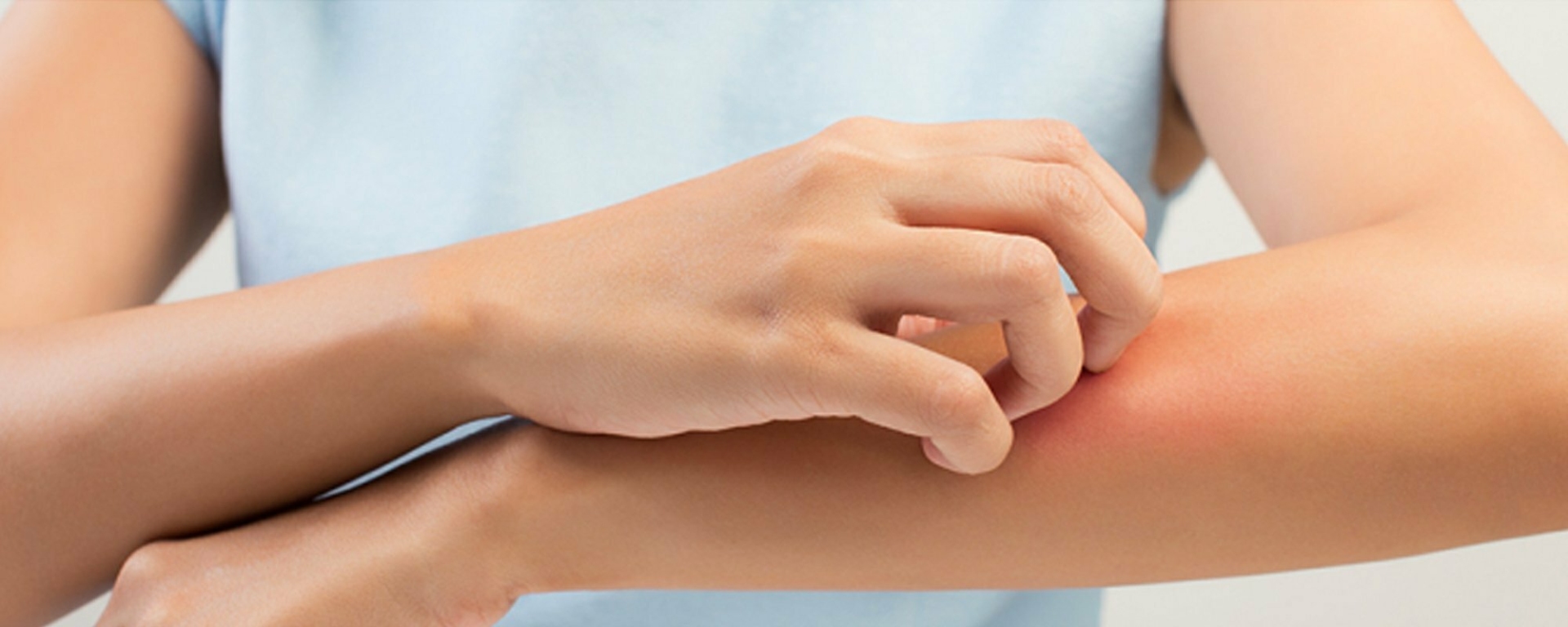Types of psoriasis: symptoms and common areas
Psoriasis can surface in many ways. Each type has distinct features, so let’s explore the different forms of this skin condition.
Plaque psoriasis
Plaque psoriasis symptoms
Plaque psoriasis is the most common type. It’s characterized by red, scaly patches covered with silvery flakes. Symptoms typically come in episodes, followed by remission periods when they may disappear completely for months or even years.
Common areas:
- Elbows
- Knees
- Scalp (scalp psoriasis)
- Torso
Though usually found in these areas, plaque psoriasis can appear anywhere on the body.
Guttate psoriasis
Guttate psoriasis symptoms
This type appears as small, red, drop-shaped spots. Itching is common, and it often develops after an infection like strep throat. Typically, guttate psoriasis clears up on its own after a few weeks or months.
Common areas:
- Torso
- Arms
- Legs
Pustular psoriasis
Pustular psoriasis symptoms
Characterized by white pustules surrounded by red, inflamed skin. Although they look infectious, they’re not contagious. After a few days, the pustules dry up, leaving crusts or scales. This type can have active and remission phases.
Common areas:
- Soles of the feet
- Palms of the hands
- Fingers
Inverse psoriasis
Inverse psoriasis symptoms
This form affects skin folds like the armpits and groin. It appears as red, shiny, well-defined patches. Because of the moisture in these areas, the skin doesn’t peel like with other forms, but it may crack and become painful.
Common areas:
- Underarms
- Beneath the breasts
- Groin area
- Between the buttocks
- Around the genitals (genital psoriasis)
Arthritic psoriasis
Arthritic psoriasis symptoms
Psoriatic arthritis affects 5%–30% of people with psoriasis. It causes joint pain, swelling and morning stiffness, usually developing years after skin symptoms appear. Risk factors include extensive skin involvement, prolonged flares or nail psoriasis.
Erythrodermic psoriasis
Erythrodermic psoriasis symptoms
This rare but serious type of psoriasis causes widespread redness over much of the body, intense itching, burning, swelling, and peeling skin. Additional symptoms can include fever, chills, rapid heart rate, joint pain or swollen lymph nodes. Immediate medical attention is needed.
Common areas:
- More than 80% of the body surface
Genital psoriasis
Genital psoriasis symptoms
This form affects sensitive intimate areas and can be very uncomfortable. Irritation from sweat, tight clothing or harsh soaps can worsen symptoms. Itching is frequent, with visible red patches, though scaling is less pronounced here.
Common areas:
- Women – vulva edges (red or grey plaques)
- Men – scrotum, penis and glans of the penis
Scalp psoriasis
Scalp psoriasis symptoms
Scalp psoriasis shows up as thick, red patches covered with silver-white scales that resemble dandruff. Symptoms include severe itching and heavy flaking. While hair loss is rare, it can happen from excessive scratching or brushing.
Common areas:
- Localized or widespread across the scalp
Nail psoriasis
Nail psoriasis symptoms
Look for pitting (small holes), brittleness or detachment of the nail from the finger. Other signs include white spots, yellowish “oil drop” marks, and red lines from small blood vessels beneath the nail.
What causes psoriasis?
While the exact causes are unknown, three main triggers are often associated with psoriasis:
- Genetics (40% of cases)
- Physical or emotional stress
- Immune system response
In psoriasis, the immune system triggers skin inflammation and speeds up skin cell production — cells renew every 3–5 days instead of the usual 28–30 days, leading to the buildup of thick, scaly plaques.
Common triggers include:
- Respiratory infections
- Skin injuries (cuts, burns, sunburns)
- Stress
- Cold, dry weather
- Smoking
- Alcohol
- Obesity
- Certain medications
Psoriasis treatment options
While there’s no cure for psoriasis, treatments can help reduce symptoms. Most cases are managed with topical creams and ointments to hydrate the skin and relieve itching. Your pharmacist can recommend the best psoriasis treatment options.
Topical treatments include:
Corticosteroids – Anti-inflammatory creams to reduce redness and swelling.
Vitamin D analogues (like calcipotriol) – To slow skin cell growth.
Topical retinoids – Vitamin A derivatives that help normalize skin cell turnover.
Calcineurin inhibitors – Ideal for sensitive areas (face, folds), they help regulate immune response.
Anthralin – Slows cell growth but may irritate surrounding skin.
Coal tar – A traditional remedy used in shampoos for scalp psoriasis to reduce inflammation and itching.
What to do when psoriasis symptoms become more severe
In cases where psoriasis affects large areas of the body or when flare-ups are frequent, doctors may recommend phototherapy. This treatment involves exposing the skin to natural or artificial UV light to help slow the rapid growth of skin cells. Ongoing medical supervision is essential.
For more severe psoriasis, doctors may also prescribe oral medication, infusions, or injections as part of a targeted psoriasis treatment plan.
This information is not a substitute for professional medical advice and pharmacist-owners affiliated with Accès pharma cannot be held responsible for this information. The information was true and accurate at the time of publication, but it is subject to change.





